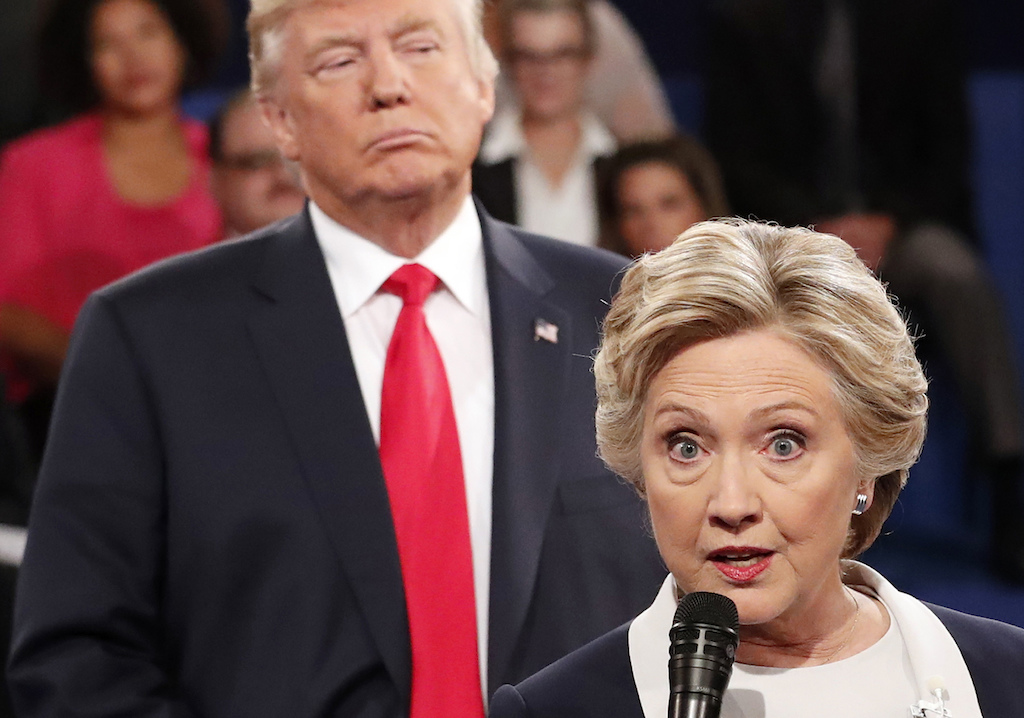During a panel on September 20 at the Brookings Institution, Whit Ayres, a Republican pollster, told a roomful of other DC intellectuals the race between Donald Trump and Hillary Clinton is starting to resemble an election in an underdeveloped nation more than it does in an advanced, industrialized economy. Rather than challenging each other on their policies and agendas for the country, he said, Trump and Clinton are making it a personality contest, not unlike two strongmen competing for the reins of a fragile government.
Then, on Sunday, Trump told Clinton during their second debate that should he win, he would appoint a special prosecutor to further investigate her “situation”—apparently a reference to her use of a private email server when she was secretary of state—with the end result of Clinton going to jail. Along with his misreading of how the Justice Department is supposed to operate (criminal investigations are under the aegis of the attorney general, not the president), Trump also made history for being the first candidate to threaten his opponent during a televised debate with imprisonment if he is elected. More than a few observers likened the Republican nominee to a dictator.
Ayres, who advised Marco Rubio on his presidential primary campaign and is working for a super PAC supporting Rubio’s US Senate re-election campaign in Florida, says Trump’s threat to jail Clinton was a “clear link” to despotic behavior. But both Clinton and Trump, he insists, are running cult-of-personality campaigns where the ideas flow down from the candidate, rather than up from their supporters. Presidential candidates have run on the strength of their personalities before, but not to this extent, Ayres says.
When you said this election’s been reminding you a lot more of an election in a third-world country than one in an advanced democracy, what did you mean by that?
In third-world countries, presidential elections are almost completely personality contests. It’s not that there’s no discussion of policy, but the policy is completely subsumed by the personalities of the candidates. Moreover, policy flows downward from the presidential contenders, not upward from the base to those contenders, so that most people end up deciding which presidential contender they like or dislike based on personality characteristics, and then they adopt whatever positions their favored candidate happens to hold.
But we’ve had presidents who rose largely on their charisma. You could say that about President Obama, Ronald Reagan, and John F. Kennedy, and you could probably go even further back than that.
All you have to do is look at the press coverage and the opinion columns. How many have you seen comparing Trump’s issue positions with Clinton’s issue positions, for example, compared to Trump’s personality and temperament compared to Clinton’s personality and temperament and actions she has taken in the past, like her emails? There’s always an element of assessment of the leadership potential of the personality and character of presidential contenders, but the overwhelming dominance of those factors in this election is what makes it unusual and make it seem much more like a third-world country.
But now Trump really sounds like a strongman. Did you sense that at all watching the debate on Sunday?
When one candidate threatens to throw the opposing candidate in jail if he wins the presidency, that is a clear link to an autocratic society and a third-world presidential race. That is not the kind of thing that should occur in a democratic system where decisions about criminal charges are supposed to be insulated from politics. That’s not saying they always are. Ask Bob McDonnell if you don’t believe that. But they are supposed to be insulated from politics, and that threat crossed a line that I don’t remember any presidential candidate in my lifetime remotely approaching.
There’s also a new ad from the Trump campaign that’s ostensibly about foreign policy, but it’s really 15 seconds of Clinton coughing or her spell at the 9/11 Memorial. It’s more of an attack on her alleged frailty than an actual policy ad. At this point is he just running as a strongman?
I don’t want to overstate it. It’s not that they haven’t talked about [policy], because Trump has talked about trade and immigration, but it’s the balance of stories and focus and attention on personality and character compared to the discussion of policy that is so completely different. Plus the way Trump’s supporters have reacted. There used to be a majority of the Republican Party that believed that free trade and fair trade ultimately helped create American jobs. That has changed now, and it has changed in part because Trump has said they don’t, so the policy preferences are flowing from the top down rather than the bottom up. I would say both candidates are running based more on personality and character of their opponents than based on policy disagreements. This is not one-sided. Both candidates are focusing on the kinds of debates that occur in third-world countries.
It’s just that only one of them is threatening to put the other in jail.
That’s true.



















